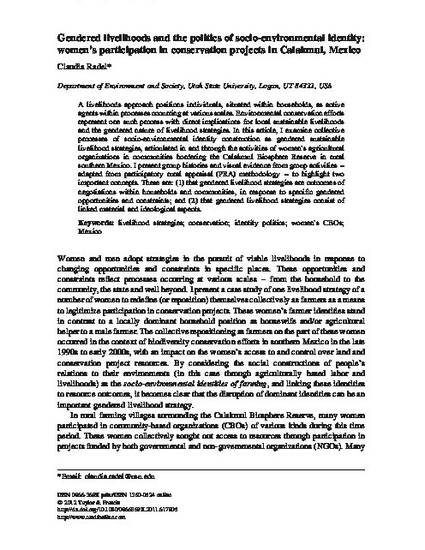
Article
Gendered livelihoods and the politics of socio-environmental identity: women's participation in conservation projects in Calakmul, Mexico
Gender, Place & Culture
(2012)
Abstract
A livelihoods approach positions individuals, situated within households, as active agents within processes occurring at various scales. Environmental conservation efforts represent one such process with direct implications for local sustainable livelihoods and the gendered nature of livelihood strategies. In this article, I examine collective processes of socio-environmental identity construction as gendered sustainable livelihood strategies, articulated in and through the activities of women's agricultural organizations in communities bordering the Calakmul Biosphere Reserve in rural southern Mexico. I present group histories and visual evidence from group activities – adapted from participatory rural appraisal (PRA) methodology – to highlight two important concepts. These are: (1) that gendered livelihood strategies are outcomes of negotiations within households and communities, in response to specific gendered opportunities and constraints; and (2) that gendered livelihood strategies consist of linked material and ideological aspects.
Disciplines
Publication Date
2012
DOI
https://doi.org/10.1080/0966369X.2011.617905
Citation Information
Claudia Radel. "Gendered livelihoods and the politics of socio-environmental identity: women's participation in conservation projects in Calakmul, Mexico" Gender, Place & Culture Vol. 19 Iss. 1 (2012) p. 61 - 82 Available at: http://works.bepress.com/claudia_radel/66/
